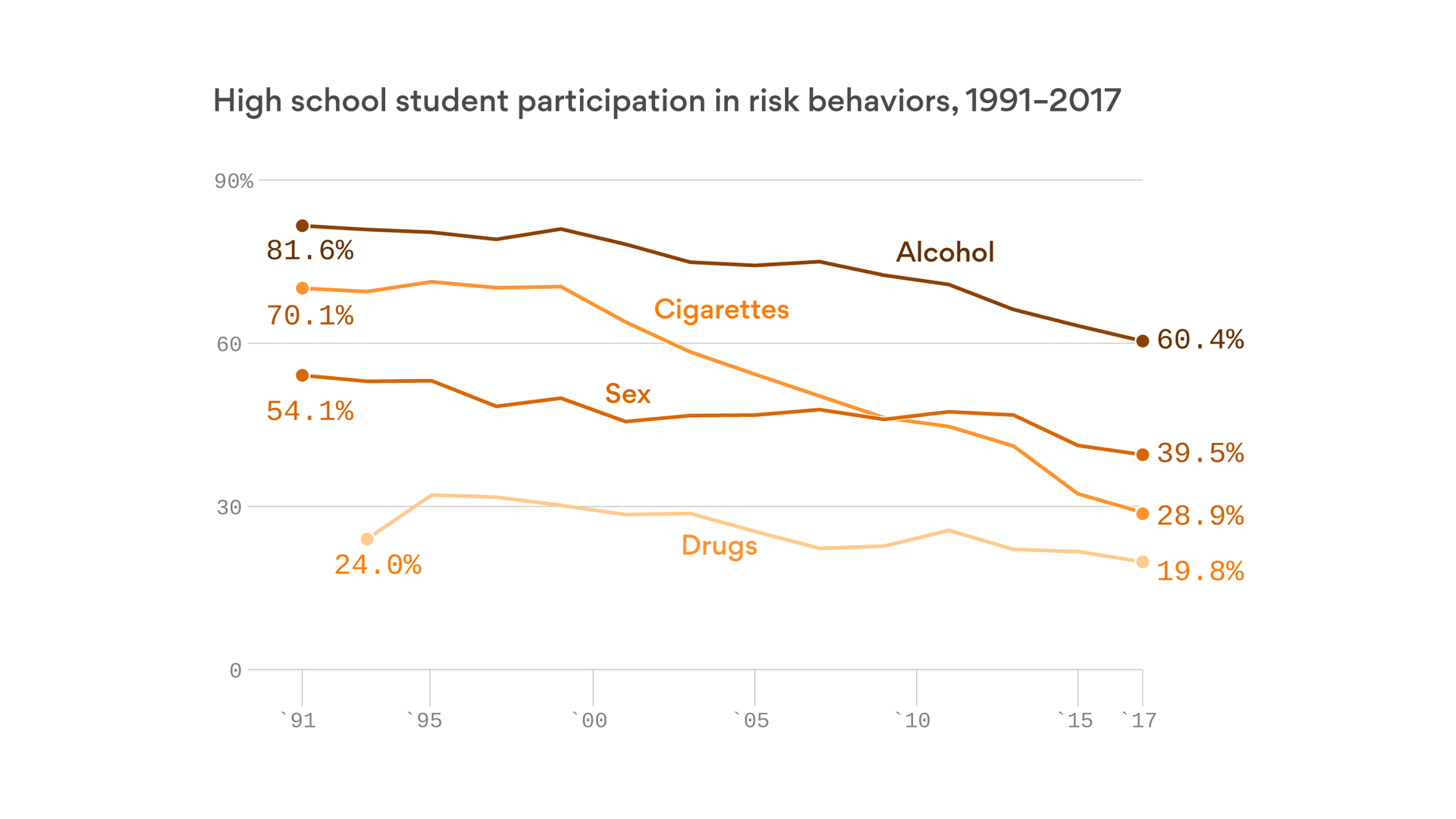I've written about this idea before. I suggested that solving the problem of toxic masculinity should take into account that most of the behavior is biologically driven.
I've suggested Thaler and Susstein's ideas about libertarian paternalism for solving societal issues.
I also think about the reduction in teen sex, drug, tobacco, and alcohol use. Was it PSAs and lectures from adults that finally got teens to stop doing the things they enjoyed doing? Or, as Jean Twenge asserts, was it changes to their environment?
The iPhone was release in 2007. Following a decades long trend of helicopter parents not letting their kids out of site, now teens could communicate with peers from the comfort of their room. It's hard to experience sex, drugs, and rock 'n' roll when you don't leave your house.
Recently I've read something similar in Slate Star Codex:
"There were two hospitals, Hospital A and Hospital B. Both, like all hospitals, were fighting a constant battle against medical errors...
"Hospital A took a very right-wing approach to the issue. They got all their doctors together and told them that any doctor who made a minor medical error would get written up and any doctor who made a major medical error would be fired.
"Hospital B took a very progressive approach...
"Then they made sweeping changes to what you might call the “society” of the hospital. They decreased doctor workload so physicians weren’t as harried. They shortened shifts to make sure everyone got at least eight hours of sleep a night. They switched from paper charts (where doctors write orders in notoriously hard-to-read handwriting) to electronic charts (where everything is typed up). They required everyone to draw up and use checklists. They even put propaganda posters over every sink reading “DID YOU WASH YOUR HANDS LONG ENOUGH??!” with a picture of a big eye on them. You can’t get more Orwellian than that.
"And yet, mirabile dictu, this was the hospital that saw their medical error rates plummet.
"The administrators of this second hospital didn’t ignore human nature. Instead, they exploited their knowledge of human nature to the fullest. They know it’s in human nature to do a bad job when you’re working on no sleep. They know it’s human nature to try to cut corners, but that people will run through checklists honestly and effectively. They even know that studies show that pictures of eyes make people behave more prosocially because they feel like they’re being watched."
It's interesting to me that Alexander calls one a right-wing approach and one a progressive approach. One it comes to campus rape culture, the labels to the approaches are inverted.
It's progressives who think they can prevent harm to women by telling men to stop being so rapey. It's conservatives who still preach things like celibacy until marriage, sex segregated dormitories, and frown upon hookup culture. They are the ones who understand human nature and suggest making changes to the environment.
The only question is: which approach works? I guess it still bothers me that we don't use our large built-in infrastructures like colleges as laboratories for testing theories. If hospitals can do it, why not colleges?
Is the latter too ideologically driven and unwilling to test theories for fear they might prove wrong? Are the stakes not high enough, since hospitals deal with literal life and death situations? It seems to me that the safety of women is pretty significant, so I'm leaning more toward the former.
If what Jonathan Haidt said is true, the increasing telos of colleges is becoming social justice and not truth. If that's the case, you would not have an interest in testing theories in the pursuit of truth.
Edit: I've recently realized that James Damore's Google Memo was basically an attempt to make changes to the tech environment to increase gender diversity. Instead, it was a good object lesson in how tact is important in influencing people in emotionally-charged topics. Good idea for a future column.


No comments:
Post a Comment